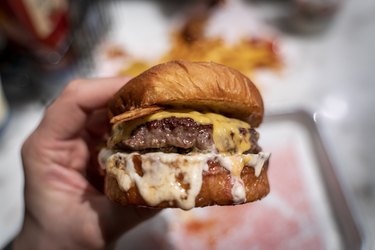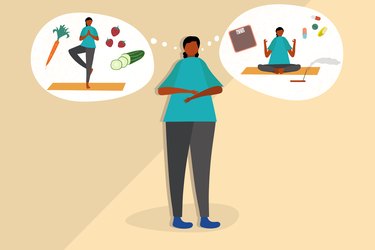
You just ate a burger and fries from your favorite fast food place and now your belly feels swollen. So what gives — does fried food cause gas?
More than 35 percent of adults eat fast food on a daily basis, according to the Centers for Disease Control and Prevention. Unfortunately, these appetizing foods can lead to some not-so-appetizing side effects, including gas, burping and nausea.
Video of the Day
Video of the Day
Fried food itself can provoke these symptoms, though in some cases, underlying health conditions may be to blame. With that said, here are the common reasons why fried food causes gas:
1. They're High in Fat
If you're feeling burpy and nauseous after an oily or fried meal, this isn't unusual. Greasy goods are among the most common foods that cause indigestion and gas (both symptoms of not digesting fats properly), per the Mayo Clinic. Spicy food, alcohol, caffeine, carbonated drinks and chocolate are other common culprits.
The reason why? Fried foods are typically high in fat, which takes longer for your body to digest than other nutrients like protein or carbohydrates. And according to the Cleveland Clinic, fatty foods stimulate the release of cholecystokinin, or CKK, from your small intestine. CKK delays gastric emptying, meaning food sticks around longer in your belly than it's supposed to.
This slowed digestion process also explains why fatty goods are among the foods that cause bloat.
"Any food can cause bloating if the stomach is emptying poorly, [given] that the food ferments there," says Patricia Raymond, MD, a gastroenterologist with Sentara Princess Anne Hospital in Virginia Beach.
If your food stays in your tummy too long, bacteria starts to break it down, which produces gases. The gases make your stomach feel swollen, causing a bit of discomfort and a "stuffed feeling."
Fix it: Because fried foods do cause gas regularly, your best bet is to limit or avoid these fatty snacks.
Tip
Overeating or eating too quickly can also contribute to symptoms of indigestion, per the Mayo Clinic, so sticking to smaller potions and snacking at a slower pace may help you avoid issues like gas and bloating.
2. They Can Contain Lactose
If you notice that your double cheeseburger with fries causes gas and bloating, fat may not be the only culprit. Fried goods often contain other foods that make you burp. A common offender? Cheese.
Indeed, cheese can cause bloating if your body isn't able to properly digest lactose, a naturally occurring sugar found in dairy products. And per the Mayo Clinic, not only does cheese cause bloating if you're lactose intolerant, but it can also lead to symptoms like:
- Diarrhea
- Nausea
- Vomiting
- Stomach cramps
- Gas
Fix it: Because cheese can make you bloated, opt for lactose-free or non-dairy alternatives instead, according to the Mayo Clinic. Lactase tablets like Lactaid can also give your body a hand at digesting these foods.
3. They Can Trigger IBS
All that belching and nausea after eating a greasy burger? It could be due to irritable bowel syndrome (IBS). According to the Mayo Clinic, IBS is a common chronic condition that causes digestive symptoms like:
- Stomach pain or cramping
- Bloating
- Changes in appearance or frequency of bowel movements
It's not clear exactly what causes IBS. While it's associated with gut sensitivity and psychiatric disorders, it can only be diagnosed based on your symptoms, rather than an objective medical test. And a high-fat diet — including fried, greasy foods — can aggravate these symptoms.
Fix it: A low-fat IBS diet can help ease discomfort for some, according to the Cleveland Clinic. It also helps to track the foods that cause burping, pain and other symptoms so you can avoid them in the future.
4. You Have Gastroparesis
Digestive issues like bloating, gas and vomiting can have a wide range of causes, including your dietary choices to lifestyle habits. But if these symptoms arise because your stomach can't get rid of food quickly enough, you could have gastroparesis, according to the American College of Gastroenterology.
Gastroparesis literally translates to "stomach paralysis," and is a digestive disorder where your stomach can't empty itself normally. Overeating is the most common cause of the condition, but underlying health issues like diabetes, infections, hypothyroidism, eating disorders and other diseases can also contribute to it. And greasy, fatty foods can trigger symptoms.
So if you regularly feel nauseous and burpy after eating, gastroparesis may be to blame. Per the National Institute of Diabetes and Digestive and Kidney Diseases (NIDDK), other symptoms of the condition include:
- Feeling full soon after starting a meal or long after eating a meal
- Vomiting
- Bloating
- Upper abdominal pain
- Heartburn
- Poor appetite
However, the disease is not common — it only affects about 50 out of 100,000 people each year, according to the NIDDK. So if you're experiencing these symptoms, another more common digestive condition (like IBS) may be the cause.
Fix it: Visit your doctor for a diagnosis and treatment plan. If you are diagnosed with gastroparesis, you'll have to be extra careful about your diet. Because fatty foods already take time to digest, most treatment plans recommend sticking to low-fat meals, per the NIDDK.
- Mayo Clinic: "Indigestion"
- Centers for Disease Control and Prevention: "Fast Food Consumption Among Adults in the United States, 2013–2016"
- Cleveland Clinic: "Cholecystokinin"
- Mayo Clinic: "Lactose Intolerance"
- National Institute of Diabetes and Digestive and Kidney Diseases: "Gastroparesis"
- American College of Gastroenterology: "Gastroparesis"
- Mayo Clinic: "Irritable bowel syndrome"
- Cleveland Clinic: "The Best and Worst Foods for IBS"
Is this an emergency? If you are experiencing serious medical symptoms, please see the National Library of Medicine’s list of signs you need emergency medical attention or call 911.


